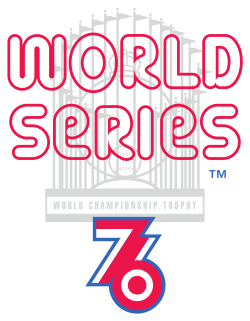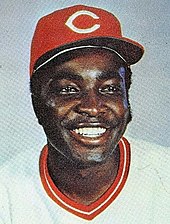
The 1975 World Series was the championship series of Major League Baseball's (MLB) 1975 season. The 72nd edition of the World Series, it was a best-of-seven playoff played between the American League (AL) champion Boston Red Sox and the National League (NL) champion Cincinnati Reds. The Reds won the series, four games to three. In 2003, ESPN ranked it the second-greatest World Series ever played, trailing only the 1991 series, while in 2020, Sam Miller of ESPN named it the best World Series ever.
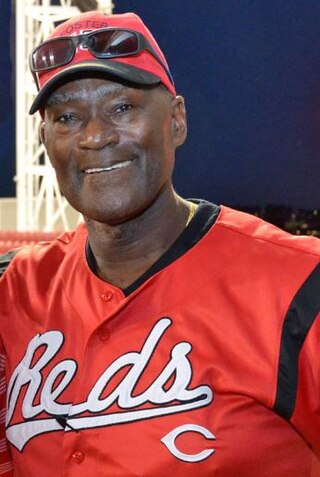
George Arthur Foster is an American former professional baseball player and scout. He played in Major League Baseball as an outfielder from 1969 through 1986, most notably as an integral member of the Cincinnati Reds, with whom he won two World Series championships, in 1975 and 1976. He also played for the San Francisco Giants, New York Mets and the Chicago White Sox.
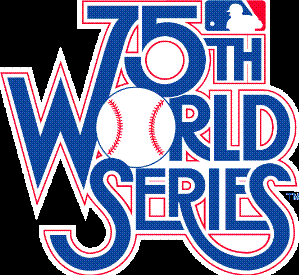
The 1978 World Series was the championship series of Major League Baseball's (MLB) 1978 season. The 75th edition of the World Series, it was a best-of-seven playoff played between the American League (AL) champion New York Yankees and the National League (NL) champion Los Angeles Dodgers. In a rematch of the previous year's World Series, the Yankees won, four games to two, to repeat as champions and to win their 22nd World Series. As of 2023, it remains the most recent World Series to feature a rematch of the previous season's matchup.

The 1977 World Series was the championship series of Major League Baseball's (MLB) 1977 season. The 74th edition of the World Series, it was a best-of-seven playoff played between the American League (AL) champion New York Yankees and the National League (NL) champion Los Angeles Dodgers. The Yankees defeated the Dodgers four games to two to win the franchise's 21st World Series championship, their first since 1962, and the first under the ownership of George Steinbrenner. Played from October 11 to 18, the Series was televised on ABC.
The 1972 World Series was the championship series of Major League Baseball's (MLB) 1972 season. The 69th edition of the World Series, it was a best-of-seven playoff between the American League champion Oakland Athletics and the National League champion Cincinnati Reds. The Athletics won in seven games for their sixth World Series championship. It was the first World Series championship for the Athletics since 1930.
The 1970 World Series was the championship series of Major League Baseball's (MLB) 1970 season. The 67th edition of the World Series, it was a best-of-seven playoff between the American League champion Baltimore Orioles and the National League champion Cincinnati Reds (102–60). The Orioles won, four games to one.
The 1932 World Series was the championship series in Major League Baseball for the 1932 season. The 29th edition of the World Series, it matched the American League champion New York Yankees versus the National League champions Chicago Cubs. The Yankees won in a four-game sweep. By far it is mostly noteworthy for Babe Ruth's "called shot" home run, in his 10th and last World Series. It was punctuated by fiery arguments between the two teams, heating up the atmosphere before the World Series even began. A record 13 future Hall of Famers played in this World Series, with three other future Hall of Famers also participating: umpire Bill Klem, Yankees manager Joe McCarthy, and Cubs manager Rogers Hornsby. It was also the first World Series in which both teams wore uniforms with numbers on the backs of the shirts.
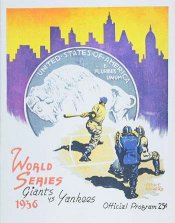
The 1936 World Series was the championship series in Major League Baseball for the 1936 season. The 33rd edition of the World Series, it matched the New York Yankees against the New York Giants, with the Yankees winning in six games to earn their fifth championship.
The 1937 World Series featured the defending champion New York Yankees and the New York Giants in a rematch of the 1936 Series. The Yankees won in five games, for their second championship in a row and their sixth in 15 years.
The 1939 World Series featured the three-time defending champion New York Yankees against the Cincinnati Reds, who were making their first Series appearance since winning the scandal-tainted 1919 World Series. The Yankees swept the Series in four games for the second straight year, winning their record fourth consecutive title. Yankee manager Joe McCarthy won his fifth title, tying the record held by Philadelphia Athletics manager Connie Mack.
The 1940 World Series matched the Cincinnati Reds against the Detroit Tigers, with the Reds winning a closely contested seven-game series. The victory secured the Reds the second championship in their franchise history and came 21 years after their victory over the scandal-tainted Chicago White Sox in 1919. This would be the Reds' last World Series championship for 35 years despite appearances in 1961, 1970, and 1972. Meanwhile, Bill Klem worked the last of his record 18 World Series as an umpire.

The 1955 World Series was the championship series to conclude the 1955 Major League Baseball (MLB) season. The Series matched the National League (NL) pennant winner Brooklyn Dodgers against the American League (AL) pennant winner New York Yankees, with the Dodgers winning the Series in seven games to capture their first championship in franchise history. It would be the only Series the Dodgers won while based in Brooklyn, as the team relocated to Los Angeles after the 1957 season. This was the fifth time in nine years that the Yankees and the Dodgers met in the World Series, with the Yankees having won in 1947, 1949, 1952, and 1953; the Yankees would also win in the 1956 rematch.

The 1977 American League Championship Series was a five-game series played between October 5 and 9, 1977, between the Eastern division champion New York Yankees and the Western division champion Kansas City Royals.
The 1976 National League Championship Series was a postseason series between the two division champions of the National League in the Cincinnati Reds and the Philadelphia Phillies. This was the eighth NLCS held in baseball history. For the fourth time in seven seasons, the Reds won the best-of-five series to reach the World Series. They did so in a three game sweep, winning easily in the first two games before ending the series in their last at bat in Game 3.
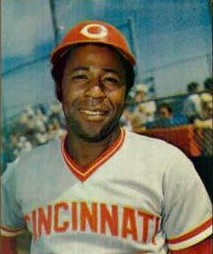
Daniel Driessen is an American former professional baseball player. He played in Major League Baseball as a first baseman from 1973 to 1987, most notably as a member of the Cincinnati Reds dynasty that won three National League pennants and two World Series championships between 1973 and 1976. He was inducted into the Cincinnati Reds Baseball Hall of Fame on June 23, 2012.
The 1973 National League Championship Series was played between the New York Mets and the Cincinnati Reds from October 6 to 10. New York won the series three games to two and advanced to the World Series, where they lost to the Oakland Athletics in what was the second of three straight world championships for Oakland. The Mets set a record for lowest win percentage by a pennant winner, finishing the regular season with an 82–79 record. However, most of the season was plagued by the injury jinx to their key players. In September they finally got healthy and just in time for the playoffs. The Mets' victory has gone down as one of the greatest upsets in MLB history, as they dominated the heavily favored Big Red Machine.
The 1975 National League Championship Series was a best-of-five match-up between the East Division champion Pittsburgh Pirates and the West Division champion Cincinnati Reds. It was the seventh NLCS in all. The Reds swept the Pirates in three games and went on to win the World Series against the Boston Red Sox.
The 1976 Cincinnati Reds season was a season in American baseball. The Reds entered the season as the reigning World Series champions. The Reds dominated the league all season and won their second consecutive National League West title with a record of 102–60, finishing ten games ahead of the Los Angeles Dodgers. With the best record in baseball, they went on to defeat the Philadelphia Phillies in the NLCS in three straight games to reach the World Series. They proceeded to win the title in four straight games over the New York Yankees. They were the third and most recent National League team to achieve this distinction, and the first since the 1921–22 New York Giants. The Reds drew 2,629,708 fans to their home games at Riverfront Stadium, an all-time franchise attendance record. As mentioned above, the Reds swept through the entire postseason with their sweeps of the Phillies and Yankees, achieving a record of 7-0. As of 2024, the Reds are the only team in baseball history to sweep through an entire postseason in the divisional era.
The 1973 Cincinnati Reds season consisted of the Reds winning the National League West with a Major League-best record of 99–63, 3+1⁄2 games ahead of the Los Angeles Dodgers, before losing the NLCS to the New York Mets in five games. The Reds were managed by Sparky Anderson, and played their home games at Riverfront Stadium.
The 1939 Cincinnati Reds season was a season in American baseball. The team finished first in the National League, winning the pennant by 4+1⁄2 games over the St. Louis Cardinals with a record of 97–57. The team went on to the 1939 World Series, which they lost in four straight games to the New York Yankees.
